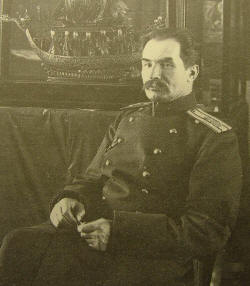Queer Places:
Smolenskoe Lutheran Cemetery
Saint Petersburg, Saint Petersburg Federal City, Russia
 Pyotr
Kuzmich Kozlov (October 3, 1863 in Dukhovshchina – September 26, 1935 in
Peterhof) was a Russian and Soviet traveler and explorer who continued the
studies of
Nikolai Przhevalsky in Mongolia and Tibet. Kozlov, who had been working in
a distillery, became the young man who had been eluding [Przhevalsky] all his
life: alert, submissive, loyal and handsome. Kozlov, later a well-respected
explorer himself, recalled his mentor in words bespeaking his attachment: At
the sight of that man from afar, having him close to me, something
extraordinary used to happen. His figure, his movements, his voice, his
aquiline head were not like other people's; the deep gaze of his strict,
handsome blue eyes seemed to penetrate right into your soul. Kozlov was with
Przhevalsky when he died in 1888, and in 1905 realised Przhevalsky's dream of
meeting the Dalai Lama in Lhasa.
Pyotr
Kuzmich Kozlov (October 3, 1863 in Dukhovshchina – September 26, 1935 in
Peterhof) was a Russian and Soviet traveler and explorer who continued the
studies of
Nikolai Przhevalsky in Mongolia and Tibet. Kozlov, who had been working in
a distillery, became the young man who had been eluding [Przhevalsky] all his
life: alert, submissive, loyal and handsome. Kozlov, later a well-respected
explorer himself, recalled his mentor in words bespeaking his attachment: At
the sight of that man from afar, having him close to me, something
extraordinary used to happen. His figure, his movements, his voice, his
aquiline head were not like other people's; the deep gaze of his strict,
handsome blue eyes seemed to penetrate right into your soul. Kozlov was with
Przhevalsky when he died in 1888, and in 1905 realised Przhevalsky's dream of
meeting the Dalai Lama in Lhasa.
Although prepared by his parents for a military career, Kozlov chose to
join Nikolai Przhevalsky's expedition. After his mentor's death, Kozlov
continued traveling in Asia with his successors, Pevtsov and Roborovsky. In
1895, he took general command of the expedition from ailing Roborovsky. From
1899 to 1901, he explored and later described in a book the upper reaches of
the Yellow River, Yangtze, and Mekong rivers, for which he received the
Constantine Medal in 1902.[1]
During the first decade of the 20th century, when the Great Game reached
its peak, Kozlov rivaled Sven Hedin and Aurel Stein as the foremost researcher
of Xinjiang. Although he was on good terms with Hedin and other foreign
explorers, the British government, as represented by George Macartney,
monitored his movements across Central Asia. Kozlov's 1905 visit to the Dalai
Lama in Urga gave "the British War Office a fright",[2]
especially after the Lama declared his intention to "settle within the
confines of Russia".[3]
During his expedition of 1907–1909, Kozlov explored the Gobi Desert and
discovered the ruins of Khara-Khoto, a Tangut city destroyed by the Ming
Chinese in 1372. It took him several years to excavate the site and bring to
St. Petersburg no less than 2,000 books in the Tangut language he uncovered
there. Kozlov described his findings in a large volume entitled Mongolia
and Amdo and the Dead City of Khara-Khoto (1923). He was awarded the 1911
Royal Geographical Society's Founder's Gold Medal for his explorations.[4]
His last expedition to Mongolia and Tibet (1923–1926) resulted in the
discovery of an unprecedented number of Xiongnu royal burials at Noin-Ula.[5]
After bringing to Petrograd some amazing samples of 2000-year-old Bactrian
textiles, Kozlov retired from scientific work and settled in a village near
Novgorod.
Kozlov married Elizabeth Kozlova, a woman 29 years his junior, who
accompanied him on his final journey of exploration as the expedition
ornithologist, and who was to publish many monographs and scientific papers on
the avifauna of Central Asia.
My published books:


BACK TO HOME PAGE

- https://en.wikipedia.org/wiki/Pyotr_Kozlov
- Colonialism and Homosexuality
Robert Aldrich
Routledge, Jan 28, 2008
 Pyotr
Kuzmich Kozlov (October 3, 1863 in Dukhovshchina – September 26, 1935 in
Peterhof) was a Russian and Soviet traveler and explorer who continued the
studies of
Nikolai Przhevalsky in Mongolia and Tibet. Kozlov, who had been working in
a distillery, became the young man who had been eluding [Przhevalsky] all his
life: alert, submissive, loyal and handsome. Kozlov, later a well-respected
explorer himself, recalled his mentor in words bespeaking his attachment: At
the sight of that man from afar, having him close to me, something
extraordinary used to happen. His figure, his movements, his voice, his
aquiline head were not like other people's; the deep gaze of his strict,
handsome blue eyes seemed to penetrate right into your soul. Kozlov was with
Przhevalsky when he died in 1888, and in 1905 realised Przhevalsky's dream of
meeting the Dalai Lama in Lhasa.
Pyotr
Kuzmich Kozlov (October 3, 1863 in Dukhovshchina – September 26, 1935 in
Peterhof) was a Russian and Soviet traveler and explorer who continued the
studies of
Nikolai Przhevalsky in Mongolia and Tibet. Kozlov, who had been working in
a distillery, became the young man who had been eluding [Przhevalsky] all his
life: alert, submissive, loyal and handsome. Kozlov, later a well-respected
explorer himself, recalled his mentor in words bespeaking his attachment: At
the sight of that man from afar, having him close to me, something
extraordinary used to happen. His figure, his movements, his voice, his
aquiline head were not like other people's; the deep gaze of his strict,
handsome blue eyes seemed to penetrate right into your soul. Kozlov was with
Przhevalsky when he died in 1888, and in 1905 realised Przhevalsky's dream of
meeting the Dalai Lama in Lhasa. 
